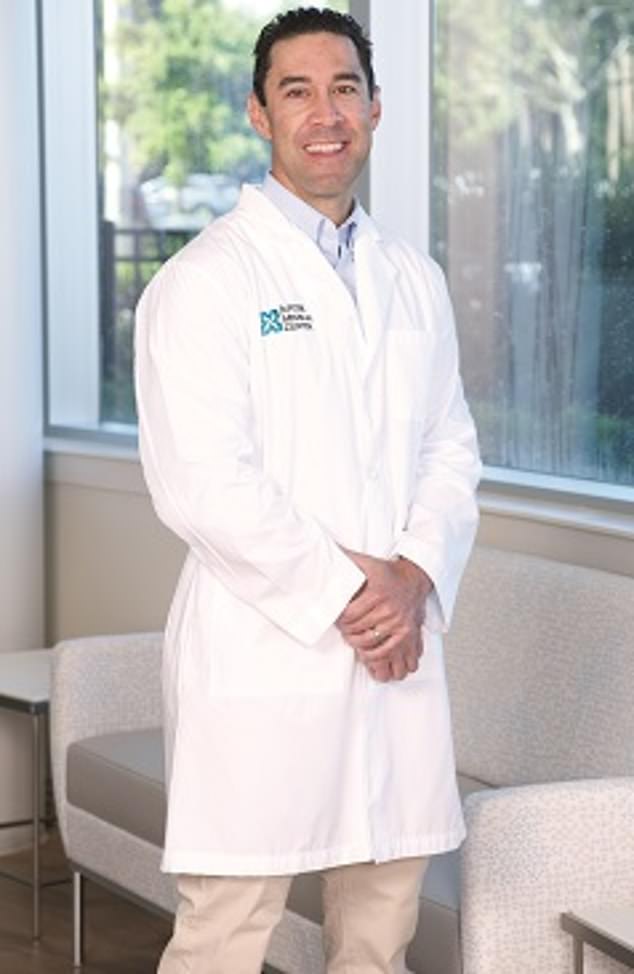As a surgeon treating patients with advanced ovarian cancer, my job has more than its fair share of dark moments.
This odious disease is notoriously difficult to diagnose: it cannot be detected, there are often no early symptoms, and when there are (such as bloating or abdominal pain), the cancer is usually already advanced.
It is no wonder that ovarian cancer is also known as the “silent killer.”
When a patient is finally diagnosed (there are around 7,500 new cases in the UK each year and around 4,100 deaths from ovarian cancer), surgeons like me are fighting against relentless odds.
And just as importantly, the average five-year survival rate is less than 50 percent (less than for breast or lung cancer) because it is often detected too late.
Only around 20 per cent of ovarian cancer cases in the UK are detected early.
That’s why we need to look for ways to prevent the disease rather than playing a desperate game of catch-up once the diagnosis is confirmed.
We need to look at ways to prevent the disease rather than playing a desperate game of catch-up once the diagnosis is confirmed, writes Professor Michael Worley
We already do this with preventive surgery (to remove at-risk tissue) for women with a family history of breast or ovarian cancer, usually after a defective gene linked to a high likelihood of developing these diseases has been discovered.
But I firmly believe that we can also help the many thousands more people who do not have this genetic risk, by performing surgery to remove the fallopian tubes in women who are already destined for other pelvic or abdominal operations, including hysterectomy, fibroid removal, caesarean section or even gallbladder removal.
Known as opportunistic salpingectomy, it is usually performed as a form of permanent birth control, as well as to treat conditions such as an ectopic pregnancy or endometriosis.
However, few people realise that it could also protect many more women from ovarian cancer, as long as they are sure they do not want to have more children (the procedure leads to sterility).
In fact, evidence suggests that removing the fallopian tubes reduces a woman’s lifetime risk of ovarian cancer to as close to zero as possible.
But how does removing the fallopian tubes prevent ovarian cancer?
The term ovarian cancer is actually misleading as the disease predominantly begins in the fallopian tubes before spreading to the ovaries.
In fact, only a small percentage of ovarian cancers (mostly rare) begin in one ovary.
This is important because, unlike removing the ovaries (which can cause surgical menopause and increase the risk of cardiovascular disease and osteoporosis), removing the fallopian tubes is risk-free; they serve no purpose other than to transport the egg.
Its removal does not cause early menopause because the ovaries (which determine the state of menopause through hormone production) remain intact.
Therefore, ovulation continues normally but the released eggs simply dissolve.
And there is no extra risk of bleeding because the fallopian tubes are not in a densely vascularized area (there is a limited blood supply).
In addition, the procedure is quick and easy, and it only takes a few minutes to remove these 4-5 cm tubes.
That’s why the operation, for the right women, could be a game-changer in our battle against ovarian cancer.
And that’s why I’m part of an initiative involving five major cancer centers in the U.S., including the Dana-Farber Cancer Institute, where I work, to raise awareness about the procedure among more women and doctors.
We want doctors in the UK and around the world to follow our example.
Some countries have already joined in. The risk of ovarian cancer in Canada decreased after salpingectomy was recommended for women undergoing a hysterectomy in 2010.
However, worldwide, most patients (and many doctors) still have no idea that ovarian cancer begins in the fallopian tubes and that opportunistic salpingectomy has the potential to reduce the risk.
To proceed with this protocol, it will be necessary to educate general surgeons on the technical aspects of fallopian tube removal.
In an ideal world, all women undergoing pelvic or abdominal surgery who are not planning to have further children would be offered the procedure. The average age of diagnosis for ovarian cancer is 63, but we believe that fallopian tube cancers take several years to develop, so the earlier this procedure can be done, the better.
Is it like using a sledgehammer to crack a nut? Not at all.
We have been trying for decades to find early diagnoses and screening tests for this disease, nothing works and no detection mechanism (imaging, blood tests, etc.) is even close to being useful.
Rather than continuing the fruitless exploration of early detection that has been carried out for decades, we propose a new strategy: prevention.
I have treated thousands of women whose prognosis has been grim and who have wondered why modern medicine cannot cure them.
Of patients who go into remission after extensive surgery and aggressive chemotherapy, about 70 to 80 percent will have a recurrence.
Even after treatment, microscopic traces of cancer may remain in the blood or abdominal cavity, as the original disease may spread over a large area.
And once cancer returns, it is almost always terminal.
Each conversation is heartbreaking. That’s why, since there are no early symptoms of this terrible disease, this relatively simple procedure is the most powerful tool we have.
Professor Michael Worley is the director of ovarian cancer surgery at Brigham and Women’s Hospital and Dana-Farber Cancer Institute in Boston, USA.
As told to ANGELA EPSTEIN


